BMS411: Leadership Styles, Culture, and Diversity at Google
VerifiedAdded on 2023/06/18
|12
|3532
|229
Report
AI Summary
This report critically evaluates statements on leadership, applying them to various styles in today's corporate world, using Google as an exemplar. It assesses the impact of leadership on organizational culture and diversity management, examining inclusive leadership styles and models. The report explores the creation of a high-performance work culture at Google, focusing on communication, perception, identity, values, motivation, and production/consumption. It also delves into the use of coaching and mentoring skills, and the application of business theories to organizational practices. The analysis covers Google's implementation of different leadership styles, such as autocratic and participative, and their effects on organizational performance. The report concludes by highlighting the importance of a positive work culture, the functions of organizational culture, and the cultural changes necessary to support effective teamwork, referencing academic sources to support its assertions. Desklib provides this document along with numerous other resources for students.
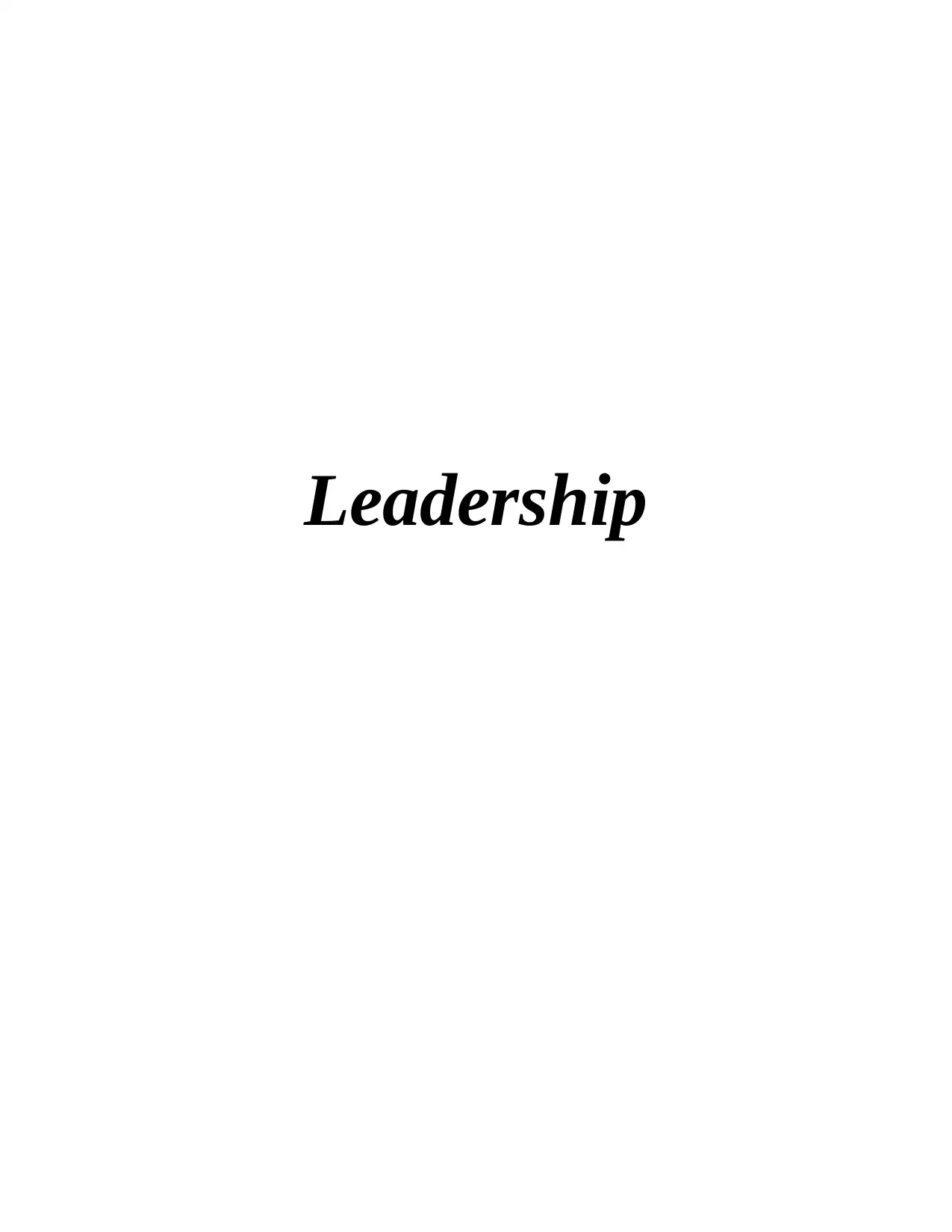
Leadership
Paraphrase This Document
Need a fresh take? Get an instant paraphrase of this document with our AI Paraphraser
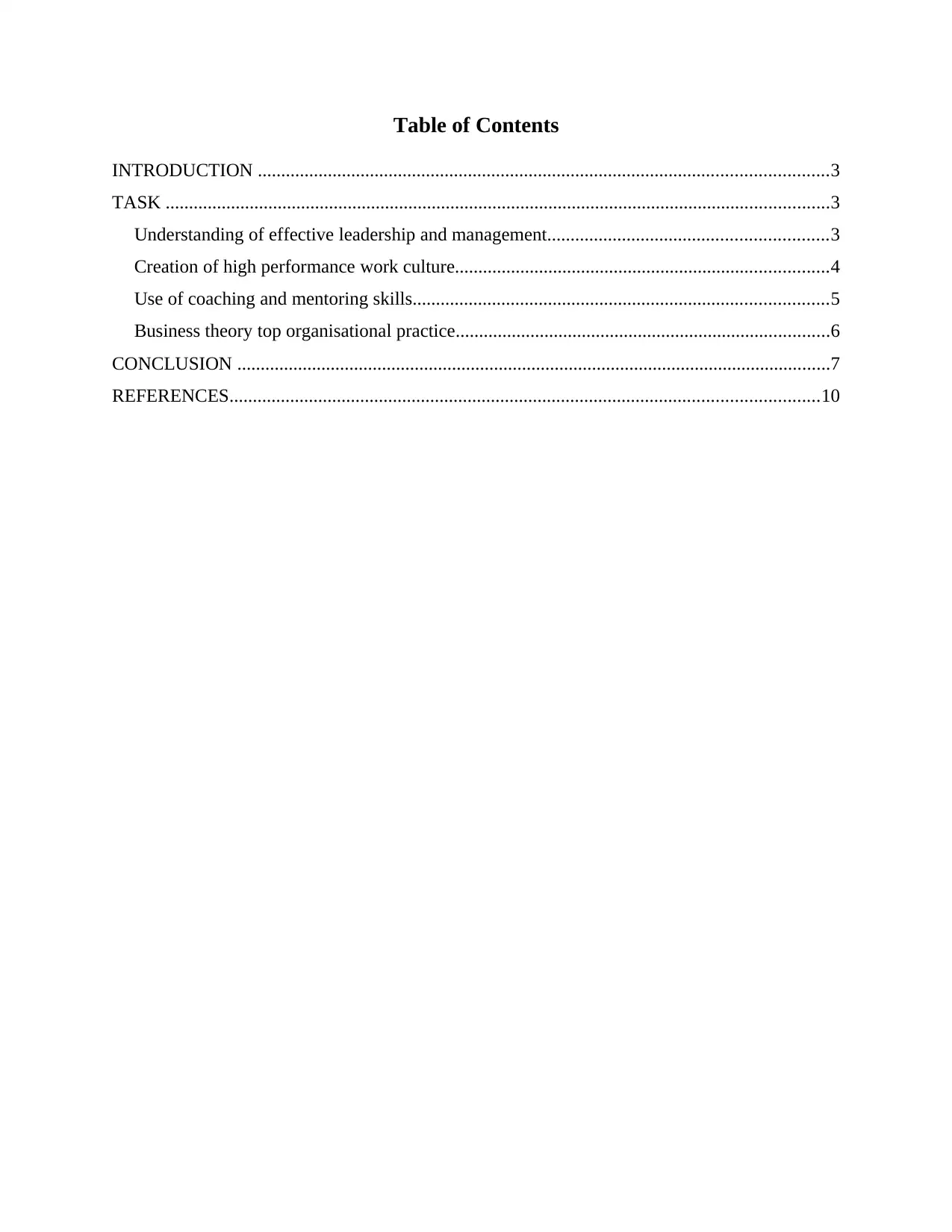
Table of Contents
INTRODUCTION ..........................................................................................................................3
TASK ..............................................................................................................................................3
Understanding of effective leadership and management............................................................3
Creation of high performance work culture................................................................................4
Use of coaching and mentoring skills.........................................................................................5
Business theory top organisational practice................................................................................6
CONCLUSION ...............................................................................................................................7
REFERENCES..............................................................................................................................10
INTRODUCTION ..........................................................................................................................3
TASK ..............................................................................................................................................3
Understanding of effective leadership and management............................................................3
Creation of high performance work culture................................................................................4
Use of coaching and mentoring skills.........................................................................................5
Business theory top organisational practice................................................................................6
CONCLUSION ...............................................................................................................................7
REFERENCES..............................................................................................................................10
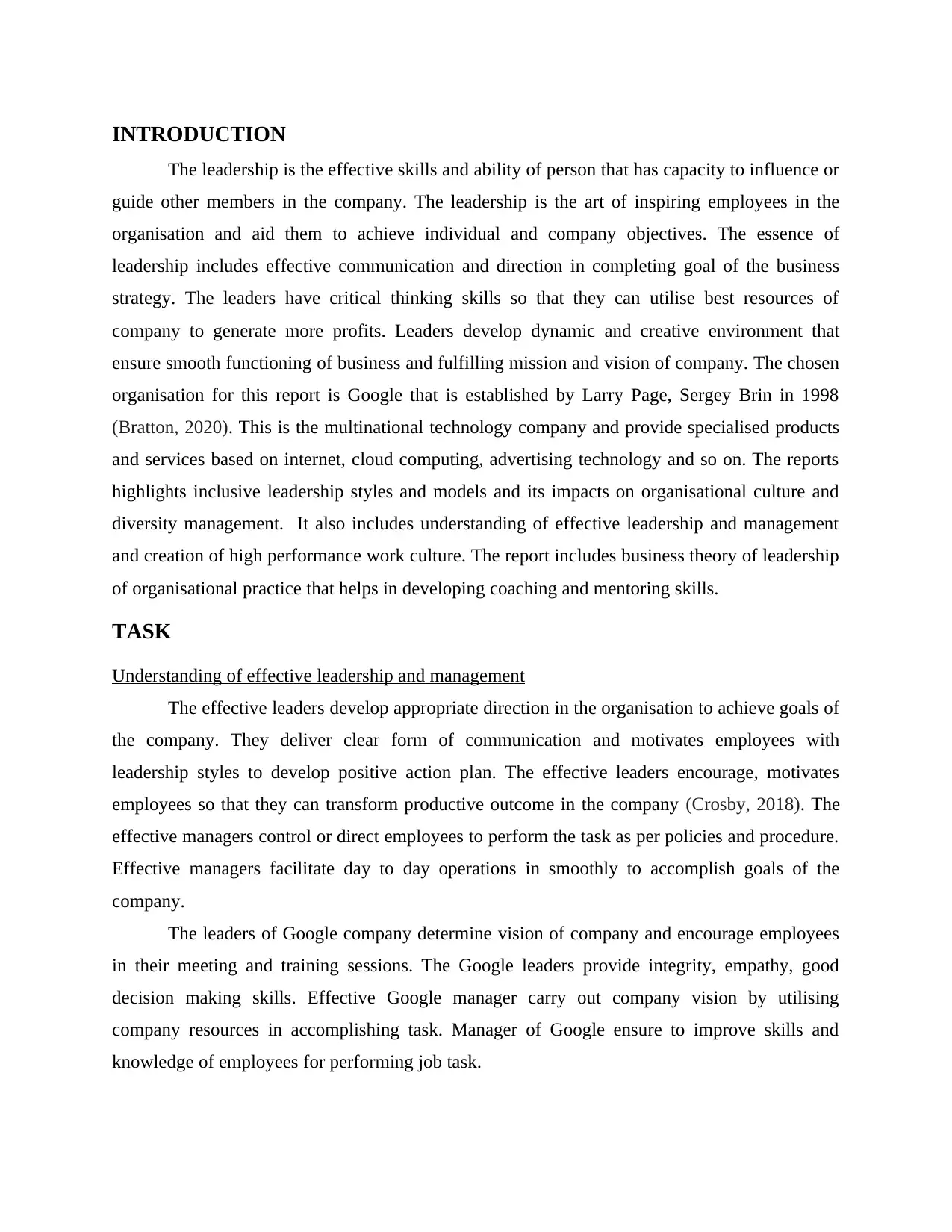
INTRODUCTION
The leadership is the effective skills and ability of person that has capacity to influence or
guide other members in the company. The leadership is the art of inspiring employees in the
organisation and aid them to achieve individual and company objectives. The essence of
leadership includes effective communication and direction in completing goal of the business
strategy. The leaders have critical thinking skills so that they can utilise best resources of
company to generate more profits. Leaders develop dynamic and creative environment that
ensure smooth functioning of business and fulfilling mission and vision of company. The chosen
organisation for this report is Google that is established by Larry Page, Sergey Brin in 1998
(Bratton, 2020). This is the multinational technology company and provide specialised products
and services based on internet, cloud computing, advertising technology and so on. The reports
highlights inclusive leadership styles and models and its impacts on organisational culture and
diversity management. It also includes understanding of effective leadership and management
and creation of high performance work culture. The report includes business theory of leadership
of organisational practice that helps in developing coaching and mentoring skills.
TASK
Understanding of effective leadership and management
The effective leaders develop appropriate direction in the organisation to achieve goals of
the company. They deliver clear form of communication and motivates employees with
leadership styles to develop positive action plan. The effective leaders encourage, motivates
employees so that they can transform productive outcome in the company (Crosby, 2018). The
effective managers control or direct employees to perform the task as per policies and procedure.
Effective managers facilitate day to day operations in smoothly to accomplish goals of the
company.
The leaders of Google company determine vision of company and encourage employees
in their meeting and training sessions. The Google leaders provide integrity, empathy, good
decision making skills. Effective Google manager carry out company vision by utilising
company resources in accomplishing task. Manager of Google ensure to improve skills and
knowledge of employees for performing job task.
The leadership is the effective skills and ability of person that has capacity to influence or
guide other members in the company. The leadership is the art of inspiring employees in the
organisation and aid them to achieve individual and company objectives. The essence of
leadership includes effective communication and direction in completing goal of the business
strategy. The leaders have critical thinking skills so that they can utilise best resources of
company to generate more profits. Leaders develop dynamic and creative environment that
ensure smooth functioning of business and fulfilling mission and vision of company. The chosen
organisation for this report is Google that is established by Larry Page, Sergey Brin in 1998
(Bratton, 2020). This is the multinational technology company and provide specialised products
and services based on internet, cloud computing, advertising technology and so on. The reports
highlights inclusive leadership styles and models and its impacts on organisational culture and
diversity management. It also includes understanding of effective leadership and management
and creation of high performance work culture. The report includes business theory of leadership
of organisational practice that helps in developing coaching and mentoring skills.
TASK
Understanding of effective leadership and management
The effective leaders develop appropriate direction in the organisation to achieve goals of
the company. They deliver clear form of communication and motivates employees with
leadership styles to develop positive action plan. The effective leaders encourage, motivates
employees so that they can transform productive outcome in the company (Crosby, 2018). The
effective managers control or direct employees to perform the task as per policies and procedure.
Effective managers facilitate day to day operations in smoothly to accomplish goals of the
company.
The leaders of Google company determine vision of company and encourage employees
in their meeting and training sessions. The Google leaders provide integrity, empathy, good
decision making skills. Effective Google manager carry out company vision by utilising
company resources in accomplishing task. Manager of Google ensure to improve skills and
knowledge of employees for performing job task.
⊘ This is a preview!⊘
Do you want full access?
Subscribe today to unlock all pages.

Trusted by 1+ million students worldwide
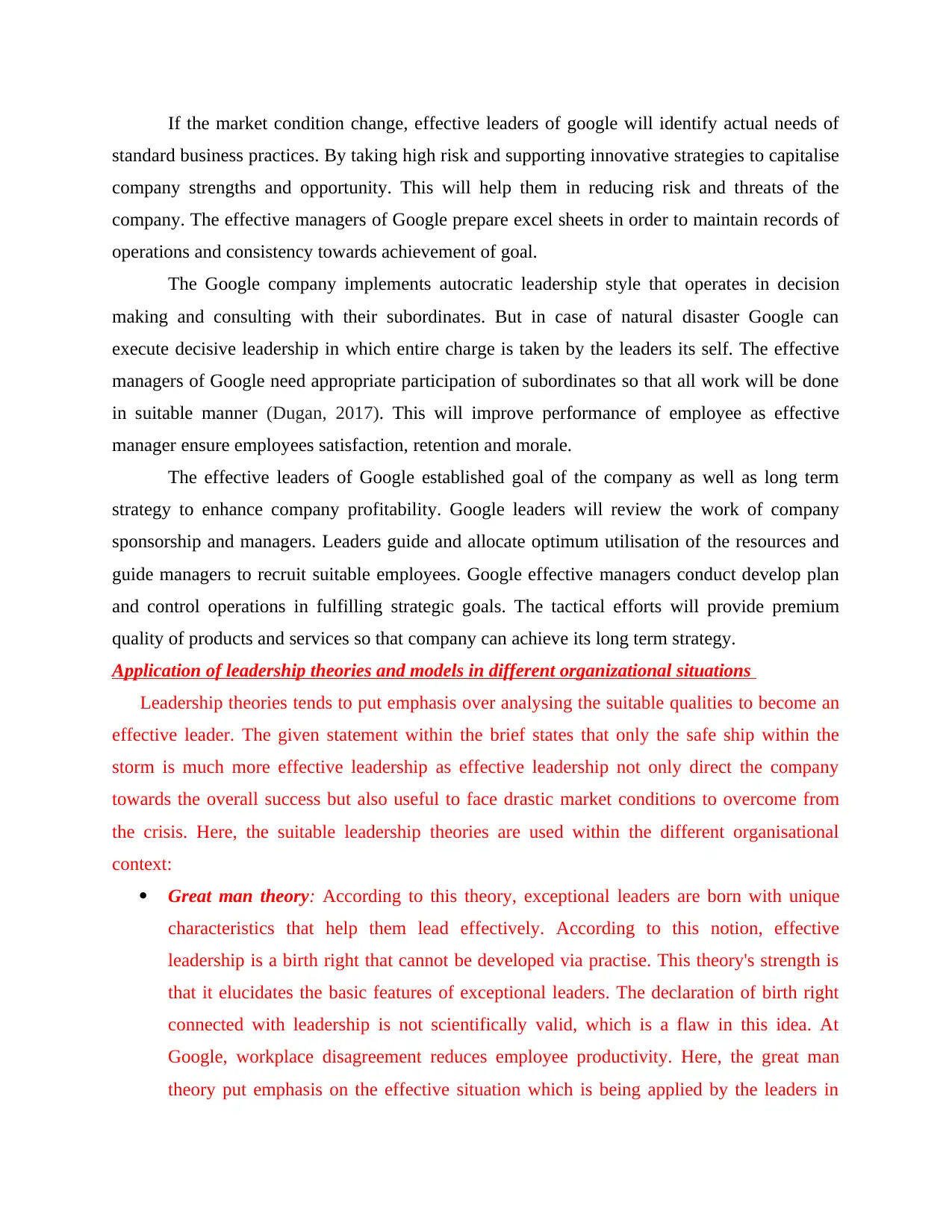
If the market condition change, effective leaders of google will identify actual needs of
standard business practices. By taking high risk and supporting innovative strategies to capitalise
company strengths and opportunity. This will help them in reducing risk and threats of the
company. The effective managers of Google prepare excel sheets in order to maintain records of
operations and consistency towards achievement of goal.
The Google company implements autocratic leadership style that operates in decision
making and consulting with their subordinates. But in case of natural disaster Google can
execute decisive leadership in which entire charge is taken by the leaders its self. The effective
managers of Google need appropriate participation of subordinates so that all work will be done
in suitable manner (Dugan, 2017). This will improve performance of employee as effective
manager ensure employees satisfaction, retention and morale.
The effective leaders of Google established goal of the company as well as long term
strategy to enhance company profitability. Google leaders will review the work of company
sponsorship and managers. Leaders guide and allocate optimum utilisation of the resources and
guide managers to recruit suitable employees. Google effective managers conduct develop plan
and control operations in fulfilling strategic goals. The tactical efforts will provide premium
quality of products and services so that company can achieve its long term strategy.
Application of leadership theories and models in different organizational situations
Leadership theories tends to put emphasis over analysing the suitable qualities to become an
effective leader. The given statement within the brief states that only the safe ship within the
storm is much more effective leadership as effective leadership not only direct the company
towards the overall success but also useful to face drastic market conditions to overcome from
the crisis. Here, the suitable leadership theories are used within the different organisational
context:
Great man theory: According to this theory, exceptional leaders are born with unique
characteristics that help them lead effectively. According to this notion, effective
leadership is a birth right that cannot be developed via practise. This theory's strength is
that it elucidates the basic features of exceptional leaders. The declaration of birth right
connected with leadership is not scientifically valid, which is a flaw in this idea. At
Google, workplace disagreement reduces employee productivity. Here, the great man
theory put emphasis on the effective situation which is being applied by the leaders in
standard business practices. By taking high risk and supporting innovative strategies to capitalise
company strengths and opportunity. This will help them in reducing risk and threats of the
company. The effective managers of Google prepare excel sheets in order to maintain records of
operations and consistency towards achievement of goal.
The Google company implements autocratic leadership style that operates in decision
making and consulting with their subordinates. But in case of natural disaster Google can
execute decisive leadership in which entire charge is taken by the leaders its self. The effective
managers of Google need appropriate participation of subordinates so that all work will be done
in suitable manner (Dugan, 2017). This will improve performance of employee as effective
manager ensure employees satisfaction, retention and morale.
The effective leaders of Google established goal of the company as well as long term
strategy to enhance company profitability. Google leaders will review the work of company
sponsorship and managers. Leaders guide and allocate optimum utilisation of the resources and
guide managers to recruit suitable employees. Google effective managers conduct develop plan
and control operations in fulfilling strategic goals. The tactical efforts will provide premium
quality of products and services so that company can achieve its long term strategy.
Application of leadership theories and models in different organizational situations
Leadership theories tends to put emphasis over analysing the suitable qualities to become an
effective leader. The given statement within the brief states that only the safe ship within the
storm is much more effective leadership as effective leadership not only direct the company
towards the overall success but also useful to face drastic market conditions to overcome from
the crisis. Here, the suitable leadership theories are used within the different organisational
context:
Great man theory: According to this theory, exceptional leaders are born with unique
characteristics that help them lead effectively. According to this notion, effective
leadership is a birth right that cannot be developed via practise. This theory's strength is
that it elucidates the basic features of exceptional leaders. The declaration of birth right
connected with leadership is not scientifically valid, which is a flaw in this idea. At
Google, workplace disagreement reduces employee productivity. Here, the great man
theory put emphasis on the effective situation which is being applied by the leaders in
Paraphrase This Document
Need a fresh take? Get an instant paraphrase of this document with our AI Paraphraser
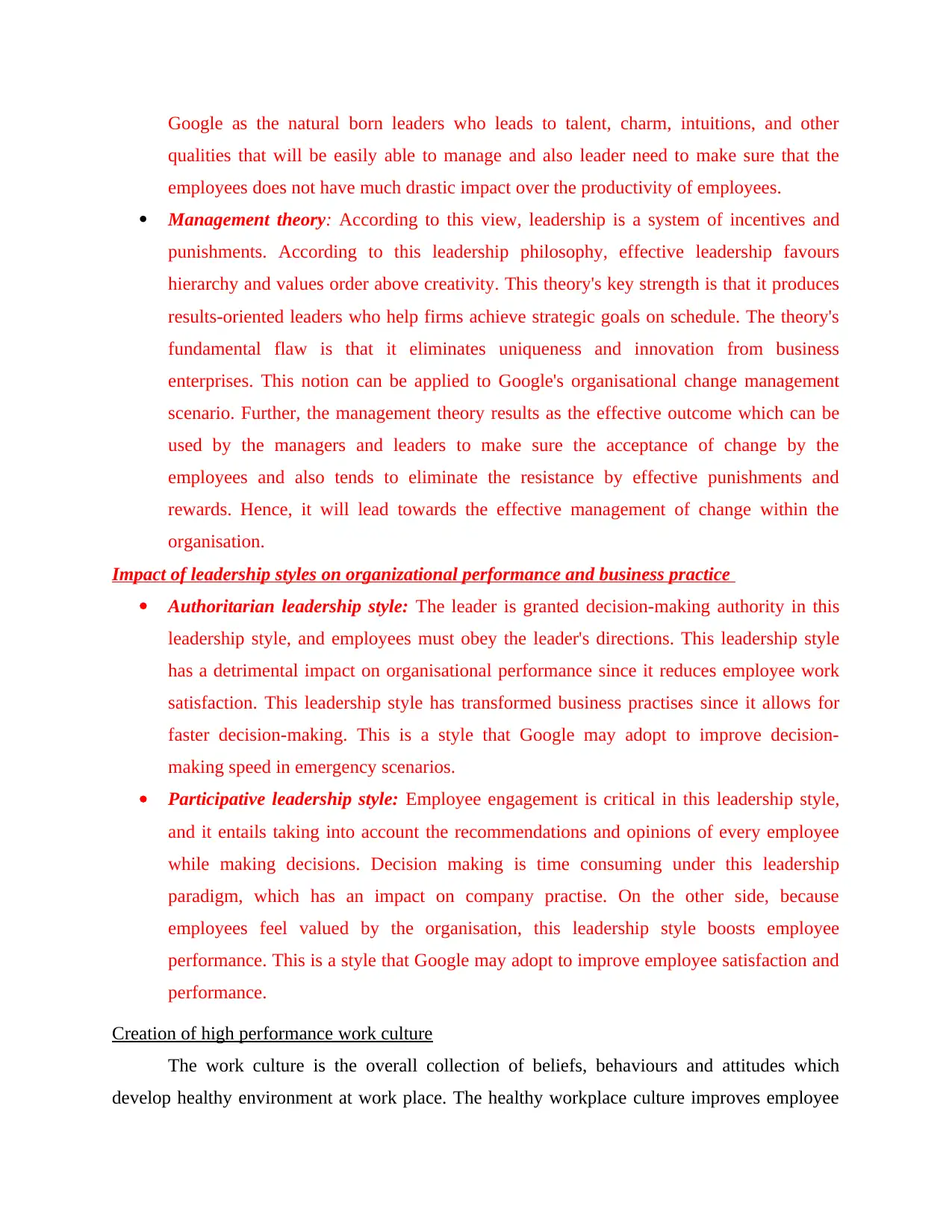
Google as the natural born leaders who leads to talent, charm, intuitions, and other
qualities that will be easily able to manage and also leader need to make sure that the
employees does not have much drastic impact over the productivity of employees.
Management theory: According to this view, leadership is a system of incentives and
punishments. According to this leadership philosophy, effective leadership favours
hierarchy and values order above creativity. This theory's key strength is that it produces
results-oriented leaders who help firms achieve strategic goals on schedule. The theory's
fundamental flaw is that it eliminates uniqueness and innovation from business
enterprises. This notion can be applied to Google's organisational change management
scenario. Further, the management theory results as the effective outcome which can be
used by the managers and leaders to make sure the acceptance of change by the
employees and also tends to eliminate the resistance by effective punishments and
rewards. Hence, it will lead towards the effective management of change within the
organisation.
Impact of leadership styles on organizational performance and business practice
Authoritarian leadership style: The leader is granted decision-making authority in this
leadership style, and employees must obey the leader's directions. This leadership style
has a detrimental impact on organisational performance since it reduces employee work
satisfaction. This leadership style has transformed business practises since it allows for
faster decision-making. This is a style that Google may adopt to improve decision-
making speed in emergency scenarios.
Participative leadership style: Employee engagement is critical in this leadership style,
and it entails taking into account the recommendations and opinions of every employee
while making decisions. Decision making is time consuming under this leadership
paradigm, which has an impact on company practise. On the other side, because
employees feel valued by the organisation, this leadership style boosts employee
performance. This is a style that Google may adopt to improve employee satisfaction and
performance.
Creation of high performance work culture
The work culture is the overall collection of beliefs, behaviours and attitudes which
develop healthy environment at work place. The healthy workplace culture improves employee
qualities that will be easily able to manage and also leader need to make sure that the
employees does not have much drastic impact over the productivity of employees.
Management theory: According to this view, leadership is a system of incentives and
punishments. According to this leadership philosophy, effective leadership favours
hierarchy and values order above creativity. This theory's key strength is that it produces
results-oriented leaders who help firms achieve strategic goals on schedule. The theory's
fundamental flaw is that it eliminates uniqueness and innovation from business
enterprises. This notion can be applied to Google's organisational change management
scenario. Further, the management theory results as the effective outcome which can be
used by the managers and leaders to make sure the acceptance of change by the
employees and also tends to eliminate the resistance by effective punishments and
rewards. Hence, it will lead towards the effective management of change within the
organisation.
Impact of leadership styles on organizational performance and business practice
Authoritarian leadership style: The leader is granted decision-making authority in this
leadership style, and employees must obey the leader's directions. This leadership style
has a detrimental impact on organisational performance since it reduces employee work
satisfaction. This leadership style has transformed business practises since it allows for
faster decision-making. This is a style that Google may adopt to improve decision-
making speed in emergency scenarios.
Participative leadership style: Employee engagement is critical in this leadership style,
and it entails taking into account the recommendations and opinions of every employee
while making decisions. Decision making is time consuming under this leadership
paradigm, which has an impact on company practise. On the other side, because
employees feel valued by the organisation, this leadership style boosts employee
performance. This is a style that Google may adopt to improve employee satisfaction and
performance.
Creation of high performance work culture
The work culture is the overall collection of beliefs, behaviours and attitudes which
develop healthy environment at work place. The healthy workplace culture improves employee
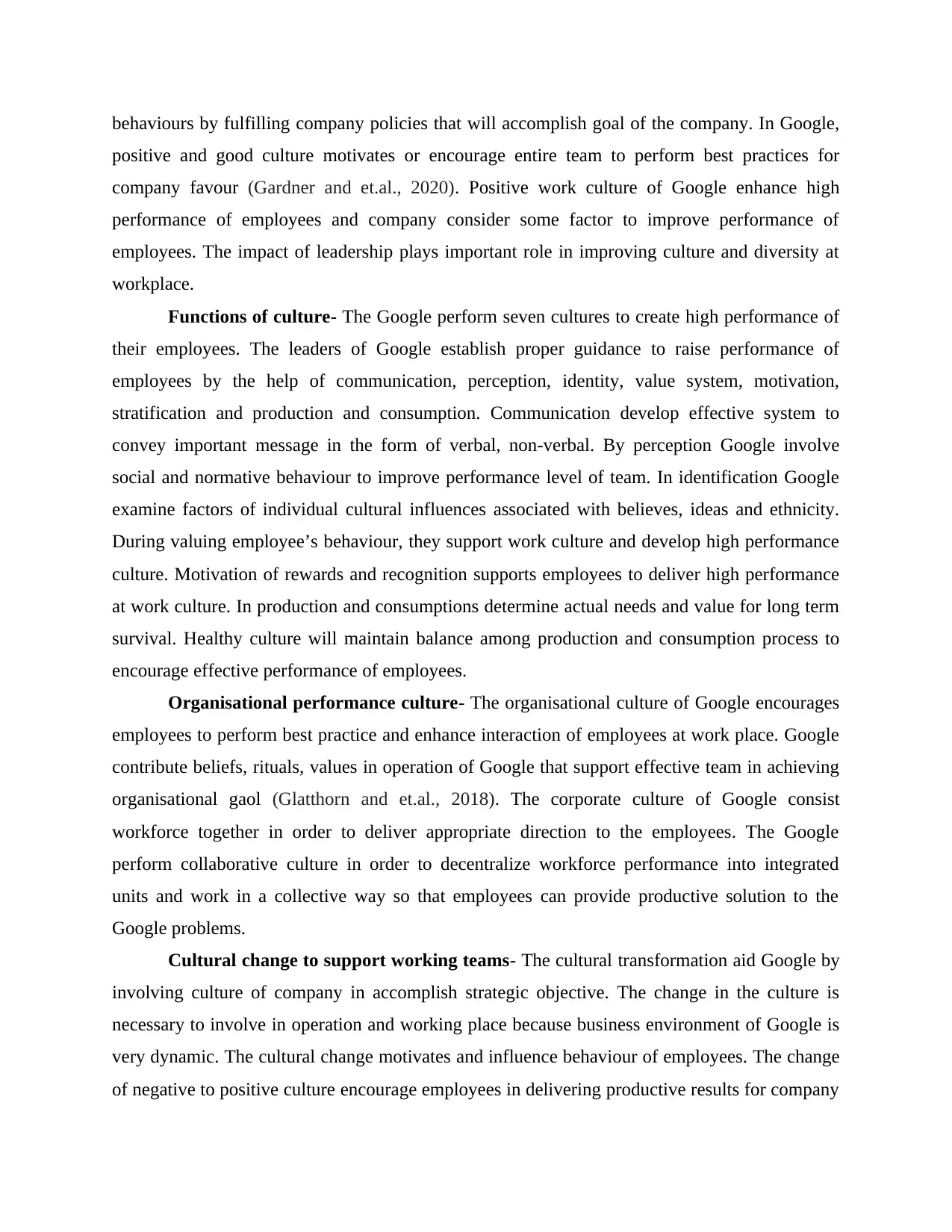
behaviours by fulfilling company policies that will accomplish goal of the company. In Google,
positive and good culture motivates or encourage entire team to perform best practices for
company favour (Gardner and et.al., 2020). Positive work culture of Google enhance high
performance of employees and company consider some factor to improve performance of
employees. The impact of leadership plays important role in improving culture and diversity at
workplace.
Functions of culture- The Google perform seven cultures to create high performance of
their employees. The leaders of Google establish proper guidance to raise performance of
employees by the help of communication, perception, identity, value system, motivation,
stratification and production and consumption. Communication develop effective system to
convey important message in the form of verbal, non-verbal. By perception Google involve
social and normative behaviour to improve performance level of team. In identification Google
examine factors of individual cultural influences associated with believes, ideas and ethnicity.
During valuing employee’s behaviour, they support work culture and develop high performance
culture. Motivation of rewards and recognition supports employees to deliver high performance
at work culture. In production and consumptions determine actual needs and value for long term
survival. Healthy culture will maintain balance among production and consumption process to
encourage effective performance of employees.
Organisational performance culture- The organisational culture of Google encourages
employees to perform best practice and enhance interaction of employees at work place. Google
contribute beliefs, rituals, values in operation of Google that support effective team in achieving
organisational gaol (Glatthorn and et.al., 2018). The corporate culture of Google consist
workforce together in order to deliver appropriate direction to the employees. The Google
perform collaborative culture in order to decentralize workforce performance into integrated
units and work in a collective way so that employees can provide productive solution to the
Google problems.
Cultural change to support working teams- The cultural transformation aid Google by
involving culture of company in accomplish strategic objective. The change in the culture is
necessary to involve in operation and working place because business environment of Google is
very dynamic. The cultural change motivates and influence behaviour of employees. The change
of negative to positive culture encourage employees in delivering productive results for company
positive and good culture motivates or encourage entire team to perform best practices for
company favour (Gardner and et.al., 2020). Positive work culture of Google enhance high
performance of employees and company consider some factor to improve performance of
employees. The impact of leadership plays important role in improving culture and diversity at
workplace.
Functions of culture- The Google perform seven cultures to create high performance of
their employees. The leaders of Google establish proper guidance to raise performance of
employees by the help of communication, perception, identity, value system, motivation,
stratification and production and consumption. Communication develop effective system to
convey important message in the form of verbal, non-verbal. By perception Google involve
social and normative behaviour to improve performance level of team. In identification Google
examine factors of individual cultural influences associated with believes, ideas and ethnicity.
During valuing employee’s behaviour, they support work culture and develop high performance
culture. Motivation of rewards and recognition supports employees to deliver high performance
at work culture. In production and consumptions determine actual needs and value for long term
survival. Healthy culture will maintain balance among production and consumption process to
encourage effective performance of employees.
Organisational performance culture- The organisational culture of Google encourages
employees to perform best practice and enhance interaction of employees at work place. Google
contribute beliefs, rituals, values in operation of Google that support effective team in achieving
organisational gaol (Glatthorn and et.al., 2018). The corporate culture of Google consist
workforce together in order to deliver appropriate direction to the employees. The Google
perform collaborative culture in order to decentralize workforce performance into integrated
units and work in a collective way so that employees can provide productive solution to the
Google problems.
Cultural change to support working teams- The cultural transformation aid Google by
involving culture of company in accomplish strategic objective. The change in the culture is
necessary to involve in operation and working place because business environment of Google is
very dynamic. The cultural change motivates and influence behaviour of employees. The change
of negative to positive culture encourage employees in delivering productive results for company
⊘ This is a preview!⊘
Do you want full access?
Subscribe today to unlock all pages.

Trusted by 1+ million students worldwide
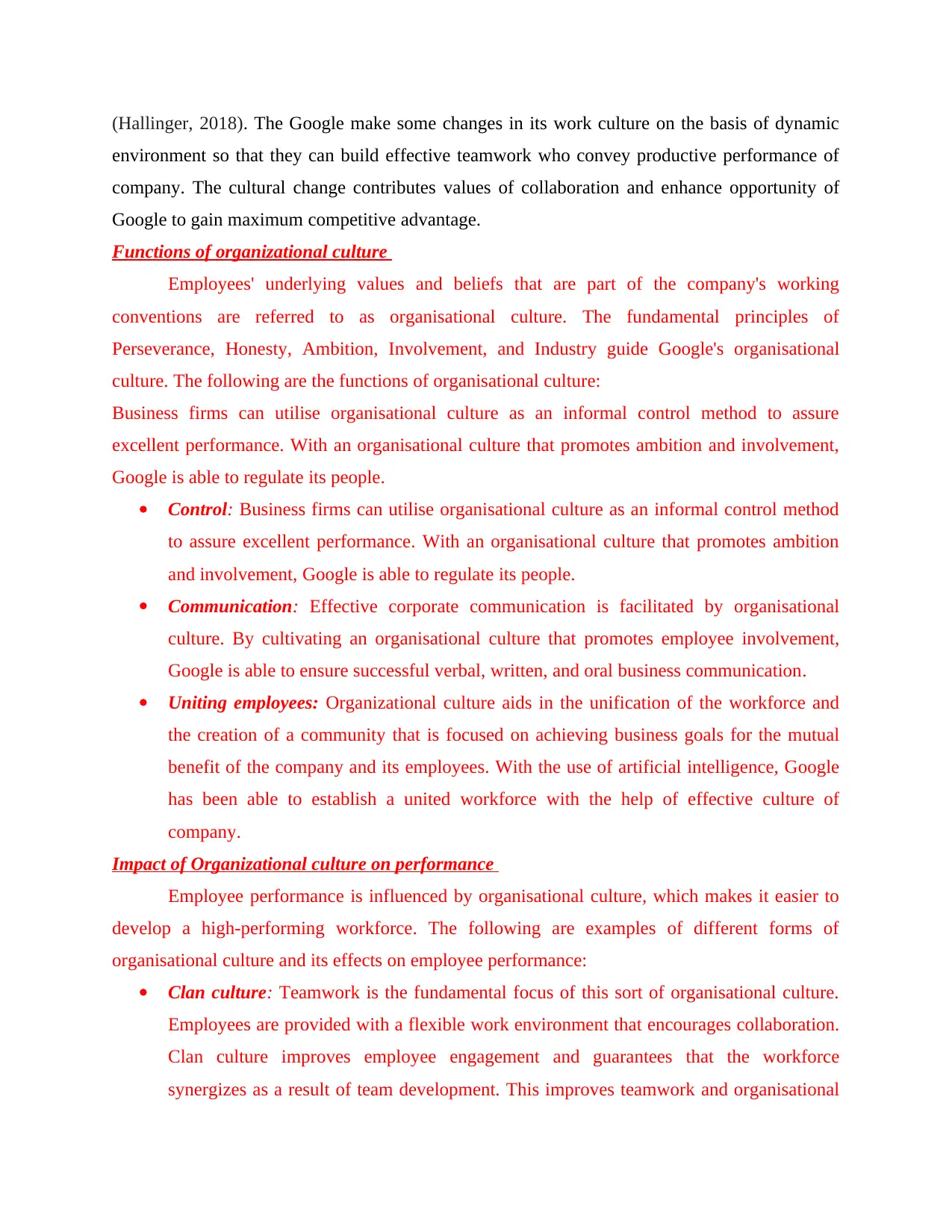
(Hallinger, 2018). The Google make some changes in its work culture on the basis of dynamic
environment so that they can build effective teamwork who convey productive performance of
company. The cultural change contributes values of collaboration and enhance opportunity of
Google to gain maximum competitive advantage.
Functions of organizational culture
Employees' underlying values and beliefs that are part of the company's working
conventions are referred to as organisational culture. The fundamental principles of
Perseverance, Honesty, Ambition, Involvement, and Industry guide Google's organisational
culture. The following are the functions of organisational culture:
Business firms can utilise organisational culture as an informal control method to assure
excellent performance. With an organisational culture that promotes ambition and involvement,
Google is able to regulate its people.
Control: Business firms can utilise organisational culture as an informal control method
to assure excellent performance. With an organisational culture that promotes ambition
and involvement, Google is able to regulate its people.
Communication: Effective corporate communication is facilitated by organisational
culture. By cultivating an organisational culture that promotes employee involvement,
Google is able to ensure successful verbal, written, and oral business communication.
Uniting employees: Organizational culture aids in the unification of the workforce and
the creation of a community that is focused on achieving business goals for the mutual
benefit of the company and its employees. With the use of artificial intelligence, Google
has been able to establish a united workforce with the help of effective culture of
company.
Impact of Organizational culture on performance
Employee performance is influenced by organisational culture, which makes it easier to
develop a high-performing workforce. The following are examples of different forms of
organisational culture and its effects on employee performance:
Clan culture: Teamwork is the fundamental focus of this sort of organisational culture.
Employees are provided with a flexible work environment that encourages collaboration.
Clan culture improves employee engagement and guarantees that the workforce
synergizes as a result of team development. This improves teamwork and organisational
environment so that they can build effective teamwork who convey productive performance of
company. The cultural change contributes values of collaboration and enhance opportunity of
Google to gain maximum competitive advantage.
Functions of organizational culture
Employees' underlying values and beliefs that are part of the company's working
conventions are referred to as organisational culture. The fundamental principles of
Perseverance, Honesty, Ambition, Involvement, and Industry guide Google's organisational
culture. The following are the functions of organisational culture:
Business firms can utilise organisational culture as an informal control method to assure
excellent performance. With an organisational culture that promotes ambition and involvement,
Google is able to regulate its people.
Control: Business firms can utilise organisational culture as an informal control method
to assure excellent performance. With an organisational culture that promotes ambition
and involvement, Google is able to regulate its people.
Communication: Effective corporate communication is facilitated by organisational
culture. By cultivating an organisational culture that promotes employee involvement,
Google is able to ensure successful verbal, written, and oral business communication.
Uniting employees: Organizational culture aids in the unification of the workforce and
the creation of a community that is focused on achieving business goals for the mutual
benefit of the company and its employees. With the use of artificial intelligence, Google
has been able to establish a united workforce with the help of effective culture of
company.
Impact of Organizational culture on performance
Employee performance is influenced by organisational culture, which makes it easier to
develop a high-performing workforce. The following are examples of different forms of
organisational culture and its effects on employee performance:
Clan culture: Teamwork is the fundamental focus of this sort of organisational culture.
Employees are provided with a flexible work environment that encourages collaboration.
Clan culture improves employee engagement and guarantees that the workforce
synergizes as a result of team development. This improves teamwork and organisational
Paraphrase This Document
Need a fresh take? Get an instant paraphrase of this document with our AI Paraphraser
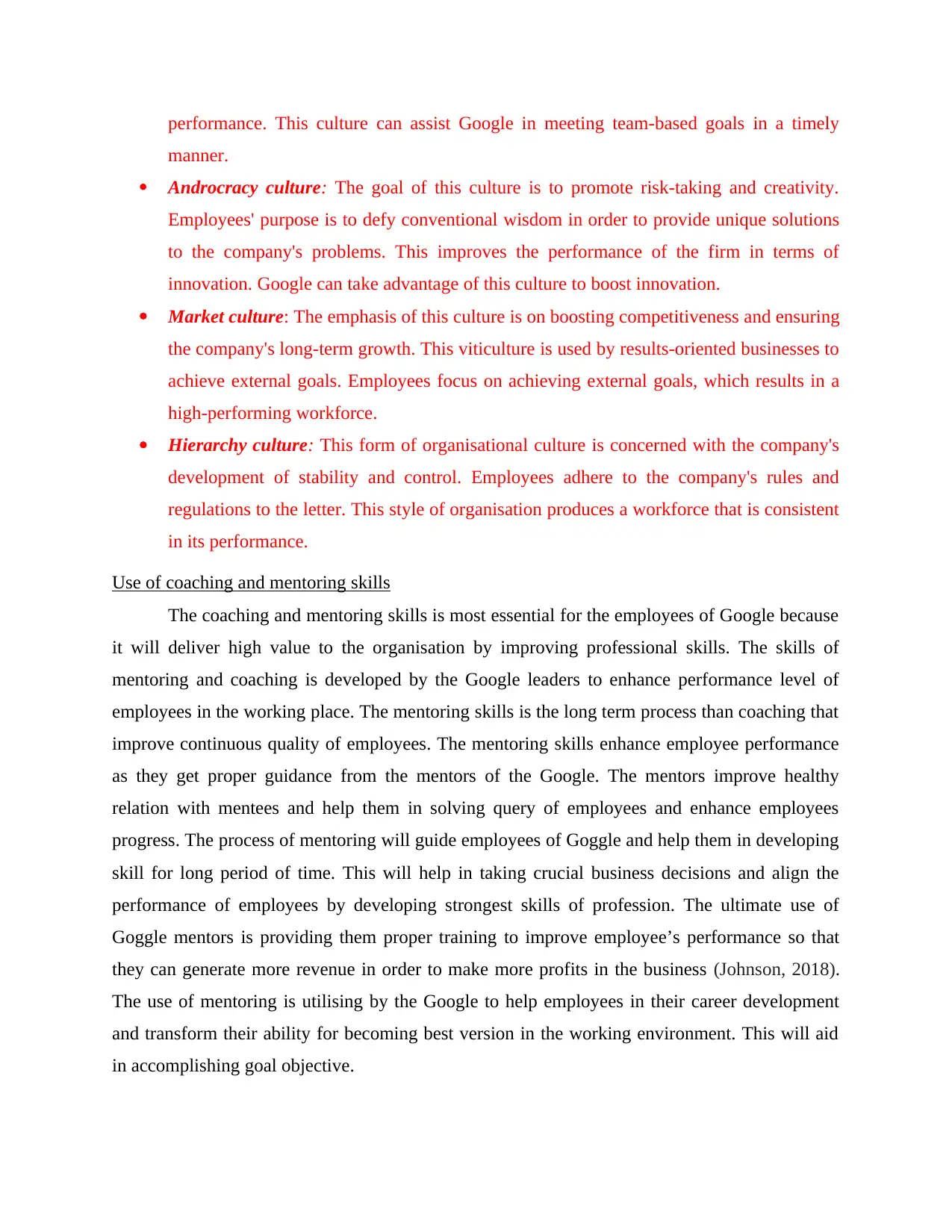
performance. This culture can assist Google in meeting team-based goals in a timely
manner.
Androcracy culture: The goal of this culture is to promote risk-taking and creativity.
Employees' purpose is to defy conventional wisdom in order to provide unique solutions
to the company's problems. This improves the performance of the firm in terms of
innovation. Google can take advantage of this culture to boost innovation.
Market culture: The emphasis of this culture is on boosting competitiveness and ensuring
the company's long-term growth. This viticulture is used by results-oriented businesses to
achieve external goals. Employees focus on achieving external goals, which results in a
high-performing workforce.
Hierarchy culture: This form of organisational culture is concerned with the company's
development of stability and control. Employees adhere to the company's rules and
regulations to the letter. This style of organisation produces a workforce that is consistent
in its performance.
Use of coaching and mentoring skills
The coaching and mentoring skills is most essential for the employees of Google because
it will deliver high value to the organisation by improving professional skills. The skills of
mentoring and coaching is developed by the Google leaders to enhance performance level of
employees in the working place. The mentoring skills is the long term process than coaching that
improve continuous quality of employees. The mentoring skills enhance employee performance
as they get proper guidance from the mentors of the Google. The mentors improve healthy
relation with mentees and help them in solving query of employees and enhance employees
progress. The process of mentoring will guide employees of Goggle and help them in developing
skill for long period of time. This will help in taking crucial business decisions and align the
performance of employees by developing strongest skills of profession. The ultimate use of
Goggle mentors is providing them proper training to improve employee’s performance so that
they can generate more revenue in order to make more profits in the business (Johnson, 2018).
The use of mentoring is utilising by the Google to help employees in their career development
and transform their ability for becoming best version in the working environment. This will aid
in accomplishing goal objective.
manner.
Androcracy culture: The goal of this culture is to promote risk-taking and creativity.
Employees' purpose is to defy conventional wisdom in order to provide unique solutions
to the company's problems. This improves the performance of the firm in terms of
innovation. Google can take advantage of this culture to boost innovation.
Market culture: The emphasis of this culture is on boosting competitiveness and ensuring
the company's long-term growth. This viticulture is used by results-oriented businesses to
achieve external goals. Employees focus on achieving external goals, which results in a
high-performing workforce.
Hierarchy culture: This form of organisational culture is concerned with the company's
development of stability and control. Employees adhere to the company's rules and
regulations to the letter. This style of organisation produces a workforce that is consistent
in its performance.
Use of coaching and mentoring skills
The coaching and mentoring skills is most essential for the employees of Google because
it will deliver high value to the organisation by improving professional skills. The skills of
mentoring and coaching is developed by the Google leaders to enhance performance level of
employees in the working place. The mentoring skills is the long term process than coaching that
improve continuous quality of employees. The mentoring skills enhance employee performance
as they get proper guidance from the mentors of the Google. The mentors improve healthy
relation with mentees and help them in solving query of employees and enhance employees
progress. The process of mentoring will guide employees of Goggle and help them in developing
skill for long period of time. This will help in taking crucial business decisions and align the
performance of employees by developing strongest skills of profession. The ultimate use of
Goggle mentors is providing them proper training to improve employee’s performance so that
they can generate more revenue in order to make more profits in the business (Johnson, 2018).
The use of mentoring is utilising by the Google to help employees in their career development
and transform their ability for becoming best version in the working environment. This will aid
in accomplishing goal objective.
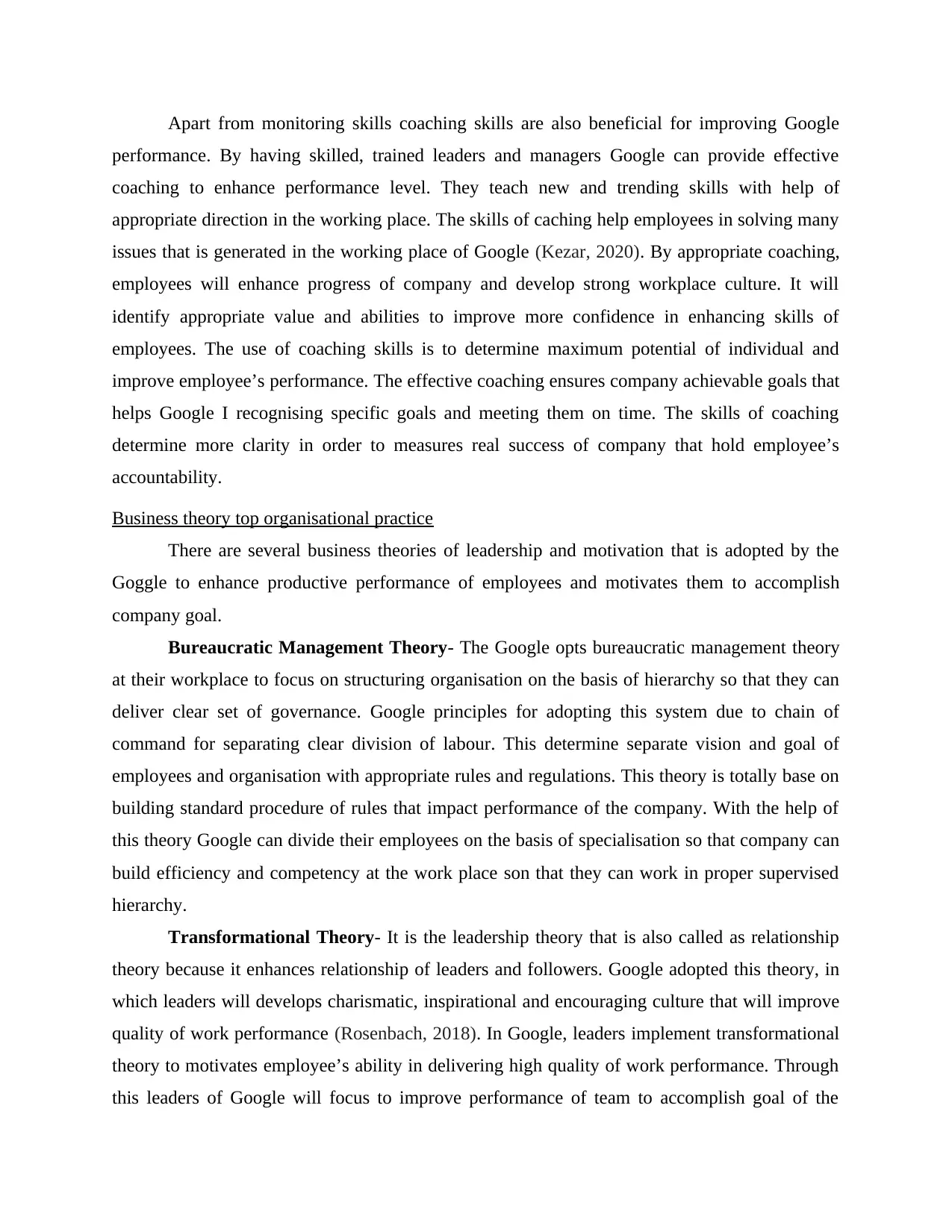
Apart from monitoring skills coaching skills are also beneficial for improving Google
performance. By having skilled, trained leaders and managers Google can provide effective
coaching to enhance performance level. They teach new and trending skills with help of
appropriate direction in the working place. The skills of caching help employees in solving many
issues that is generated in the working place of Google (Kezar, 2020). By appropriate coaching,
employees will enhance progress of company and develop strong workplace culture. It will
identify appropriate value and abilities to improve more confidence in enhancing skills of
employees. The use of coaching skills is to determine maximum potential of individual and
improve employee’s performance. The effective coaching ensures company achievable goals that
helps Google I recognising specific goals and meeting them on time. The skills of coaching
determine more clarity in order to measures real success of company that hold employee’s
accountability.
Business theory top organisational practice
There are several business theories of leadership and motivation that is adopted by the
Goggle to enhance productive performance of employees and motivates them to accomplish
company goal.
Bureaucratic Management Theory- The Google opts bureaucratic management theory
at their workplace to focus on structuring organisation on the basis of hierarchy so that they can
deliver clear set of governance. Google principles for adopting this system due to chain of
command for separating clear division of labour. This determine separate vision and goal of
employees and organisation with appropriate rules and regulations. This theory is totally base on
building standard procedure of rules that impact performance of the company. With the help of
this theory Google can divide their employees on the basis of specialisation so that company can
build efficiency and competency at the work place son that they can work in proper supervised
hierarchy.
Transformational Theory- It is the leadership theory that is also called as relationship
theory because it enhances relationship of leaders and followers. Google adopted this theory, in
which leaders will develops charismatic, inspirational and encouraging culture that will improve
quality of work performance (Rosenbach, 2018). In Google, leaders implement transformational
theory to motivates employee’s ability in delivering high quality of work performance. Through
this leaders of Google will focus to improve performance of team to accomplish goal of the
performance. By having skilled, trained leaders and managers Google can provide effective
coaching to enhance performance level. They teach new and trending skills with help of
appropriate direction in the working place. The skills of caching help employees in solving many
issues that is generated in the working place of Google (Kezar, 2020). By appropriate coaching,
employees will enhance progress of company and develop strong workplace culture. It will
identify appropriate value and abilities to improve more confidence in enhancing skills of
employees. The use of coaching skills is to determine maximum potential of individual and
improve employee’s performance. The effective coaching ensures company achievable goals that
helps Google I recognising specific goals and meeting them on time. The skills of coaching
determine more clarity in order to measures real success of company that hold employee’s
accountability.
Business theory top organisational practice
There are several business theories of leadership and motivation that is adopted by the
Goggle to enhance productive performance of employees and motivates them to accomplish
company goal.
Bureaucratic Management Theory- The Google opts bureaucratic management theory
at their workplace to focus on structuring organisation on the basis of hierarchy so that they can
deliver clear set of governance. Google principles for adopting this system due to chain of
command for separating clear division of labour. This determine separate vision and goal of
employees and organisation with appropriate rules and regulations. This theory is totally base on
building standard procedure of rules that impact performance of the company. With the help of
this theory Google can divide their employees on the basis of specialisation so that company can
build efficiency and competency at the work place son that they can work in proper supervised
hierarchy.
Transformational Theory- It is the leadership theory that is also called as relationship
theory because it enhances relationship of leaders and followers. Google adopted this theory, in
which leaders will develops charismatic, inspirational and encouraging culture that will improve
quality of work performance (Rosenbach, 2018). In Google, leaders implement transformational
theory to motivates employee’s ability in delivering high quality of work performance. Through
this leaders of Google will focus to improve performance of team to accomplish goal of the
⊘ This is a preview!⊘
Do you want full access?
Subscribe today to unlock all pages.

Trusted by 1+ million students worldwide
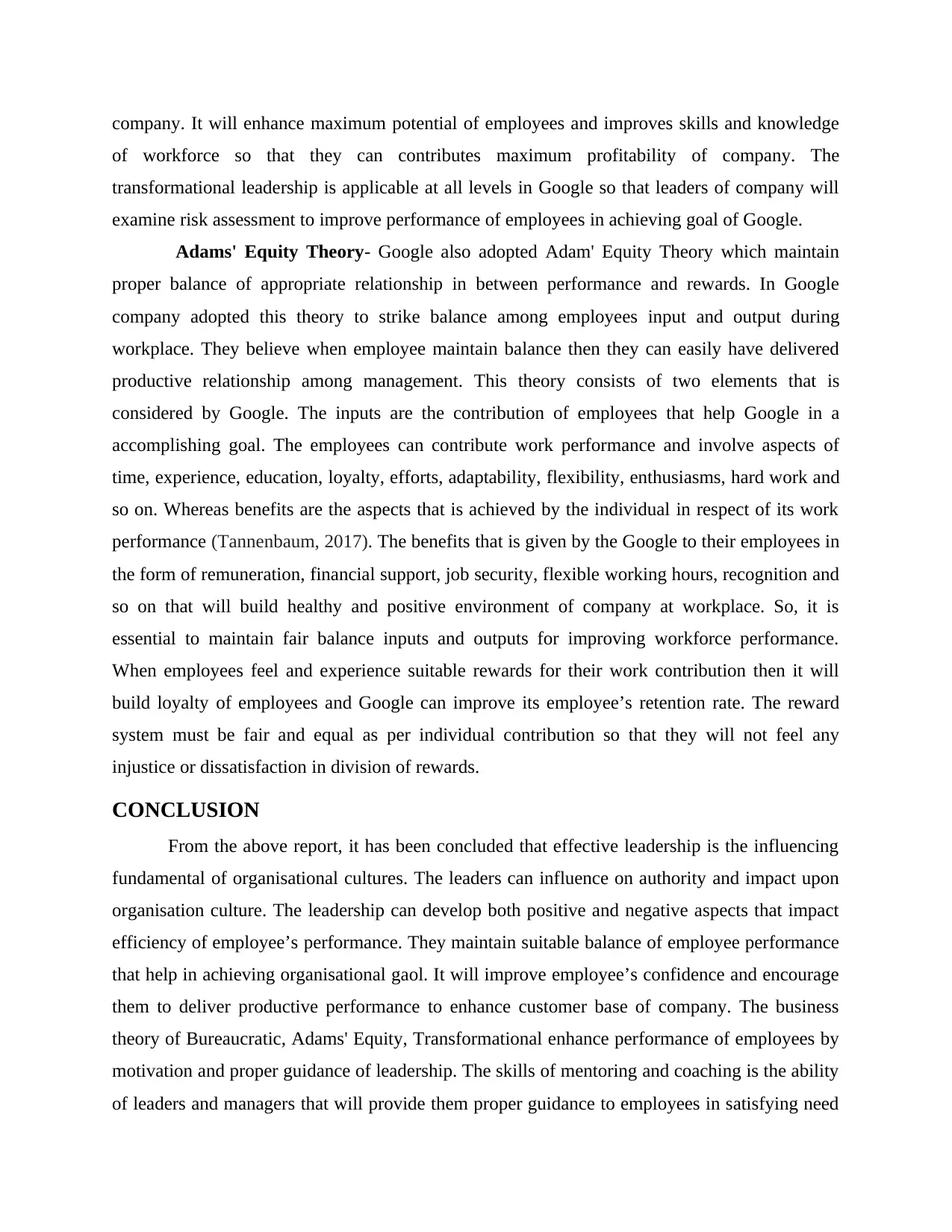
company. It will enhance maximum potential of employees and improves skills and knowledge
of workforce so that they can contributes maximum profitability of company. The
transformational leadership is applicable at all levels in Google so that leaders of company will
examine risk assessment to improve performance of employees in achieving goal of Google.
Adams' Equity Theory- Google also adopted Adam' Equity Theory which maintain
proper balance of appropriate relationship in between performance and rewards. In Google
company adopted this theory to strike balance among employees input and output during
workplace. They believe when employee maintain balance then they can easily have delivered
productive relationship among management. This theory consists of two elements that is
considered by Google. The inputs are the contribution of employees that help Google in a
accomplishing goal. The employees can contribute work performance and involve aspects of
time, experience, education, loyalty, efforts, adaptability, flexibility, enthusiasms, hard work and
so on. Whereas benefits are the aspects that is achieved by the individual in respect of its work
performance (Tannenbaum, 2017). The benefits that is given by the Google to their employees in
the form of remuneration, financial support, job security, flexible working hours, recognition and
so on that will build healthy and positive environment of company at workplace. So, it is
essential to maintain fair balance inputs and outputs for improving workforce performance.
When employees feel and experience suitable rewards for their work contribution then it will
build loyalty of employees and Google can improve its employee’s retention rate. The reward
system must be fair and equal as per individual contribution so that they will not feel any
injustice or dissatisfaction in division of rewards.
CONCLUSION
From the above report, it has been concluded that effective leadership is the influencing
fundamental of organisational cultures. The leaders can influence on authority and impact upon
organisation culture. The leadership can develop both positive and negative aspects that impact
efficiency of employee’s performance. They maintain suitable balance of employee performance
that help in achieving organisational gaol. It will improve employee’s confidence and encourage
them to deliver productive performance to enhance customer base of company. The business
theory of Bureaucratic, Adams' Equity, Transformational enhance performance of employees by
motivation and proper guidance of leadership. The skills of mentoring and coaching is the ability
of leaders and managers that will provide them proper guidance to employees in satisfying need
of workforce so that they can contributes maximum profitability of company. The
transformational leadership is applicable at all levels in Google so that leaders of company will
examine risk assessment to improve performance of employees in achieving goal of Google.
Adams' Equity Theory- Google also adopted Adam' Equity Theory which maintain
proper balance of appropriate relationship in between performance and rewards. In Google
company adopted this theory to strike balance among employees input and output during
workplace. They believe when employee maintain balance then they can easily have delivered
productive relationship among management. This theory consists of two elements that is
considered by Google. The inputs are the contribution of employees that help Google in a
accomplishing goal. The employees can contribute work performance and involve aspects of
time, experience, education, loyalty, efforts, adaptability, flexibility, enthusiasms, hard work and
so on. Whereas benefits are the aspects that is achieved by the individual in respect of its work
performance (Tannenbaum, 2017). The benefits that is given by the Google to their employees in
the form of remuneration, financial support, job security, flexible working hours, recognition and
so on that will build healthy and positive environment of company at workplace. So, it is
essential to maintain fair balance inputs and outputs for improving workforce performance.
When employees feel and experience suitable rewards for their work contribution then it will
build loyalty of employees and Google can improve its employee’s retention rate. The reward
system must be fair and equal as per individual contribution so that they will not feel any
injustice or dissatisfaction in division of rewards.
CONCLUSION
From the above report, it has been concluded that effective leadership is the influencing
fundamental of organisational cultures. The leaders can influence on authority and impact upon
organisation culture. The leadership can develop both positive and negative aspects that impact
efficiency of employee’s performance. They maintain suitable balance of employee performance
that help in achieving organisational gaol. It will improve employee’s confidence and encourage
them to deliver productive performance to enhance customer base of company. The business
theory of Bureaucratic, Adams' Equity, Transformational enhance performance of employees by
motivation and proper guidance of leadership. The skills of mentoring and coaching is the ability
of leaders and managers that will provide them proper guidance to employees in satisfying need
Paraphrase This Document
Need a fresh take? Get an instant paraphrase of this document with our AI Paraphraser
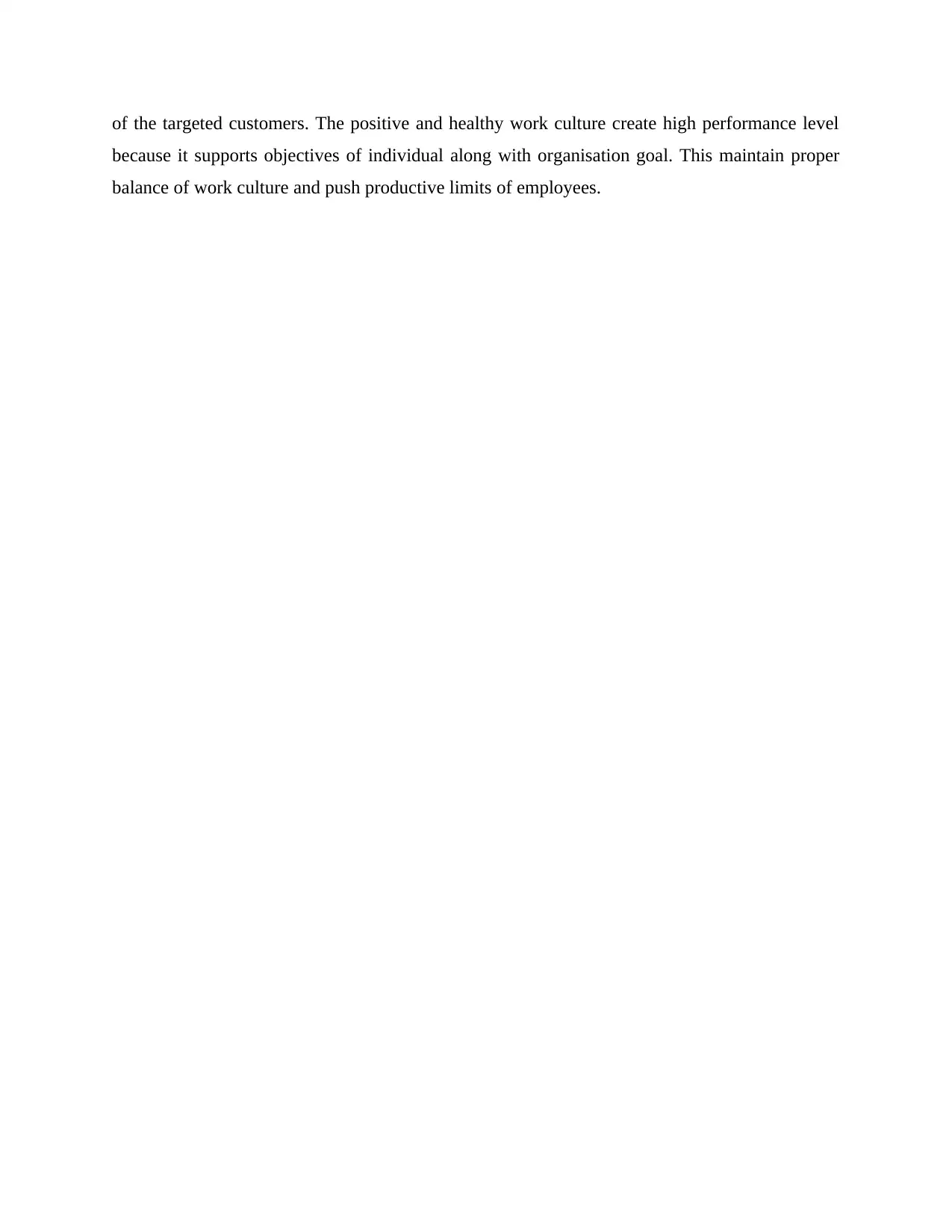
of the targeted customers. The positive and healthy work culture create high performance level
because it supports objectives of individual along with organisation goal. This maintain proper
balance of work culture and push productive limits of employees.
because it supports objectives of individual along with organisation goal. This maintain proper
balance of work culture and push productive limits of employees.
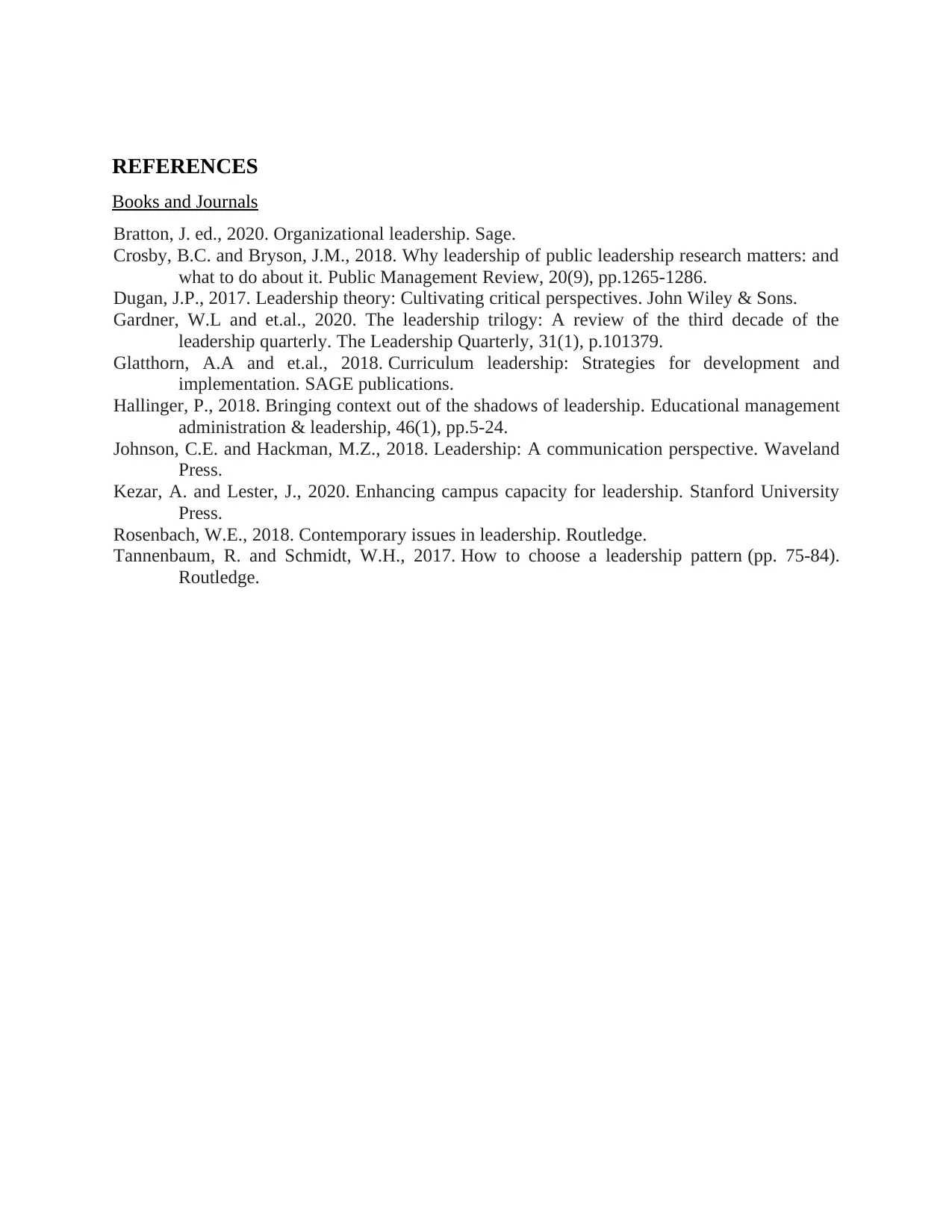
REFERENCES
Books and Journals
Bratton, J. ed., 2020. Organizational leadership. Sage.
Crosby, B.C. and Bryson, J.M., 2018. Why leadership of public leadership research matters: and
what to do about it. Public Management Review, 20(9), pp.1265-1286.
Dugan, J.P., 2017. Leadership theory: Cultivating critical perspectives. John Wiley & Sons.
Gardner, W.L and et.al., 2020. The leadership trilogy: A review of the third decade of the
leadership quarterly. The Leadership Quarterly, 31(1), p.101379.
Glatthorn, A.A and et.al., 2018. Curriculum leadership: Strategies for development and
implementation. SAGE publications.
Hallinger, P., 2018. Bringing context out of the shadows of leadership. Educational management
administration & leadership, 46(1), pp.5-24.
Johnson, C.E. and Hackman, M.Z., 2018. Leadership: A communication perspective. Waveland
Press.
Kezar, A. and Lester, J., 2020. Enhancing campus capacity for leadership. Stanford University
Press.
Rosenbach, W.E., 2018. Contemporary issues in leadership. Routledge.
Tannenbaum, R. and Schmidt, W.H., 2017. How to choose a leadership pattern (pp. 75-84).
Routledge.
Books and Journals
Bratton, J. ed., 2020. Organizational leadership. Sage.
Crosby, B.C. and Bryson, J.M., 2018. Why leadership of public leadership research matters: and
what to do about it. Public Management Review, 20(9), pp.1265-1286.
Dugan, J.P., 2017. Leadership theory: Cultivating critical perspectives. John Wiley & Sons.
Gardner, W.L and et.al., 2020. The leadership trilogy: A review of the third decade of the
leadership quarterly. The Leadership Quarterly, 31(1), p.101379.
Glatthorn, A.A and et.al., 2018. Curriculum leadership: Strategies for development and
implementation. SAGE publications.
Hallinger, P., 2018. Bringing context out of the shadows of leadership. Educational management
administration & leadership, 46(1), pp.5-24.
Johnson, C.E. and Hackman, M.Z., 2018. Leadership: A communication perspective. Waveland
Press.
Kezar, A. and Lester, J., 2020. Enhancing campus capacity for leadership. Stanford University
Press.
Rosenbach, W.E., 2018. Contemporary issues in leadership. Routledge.
Tannenbaum, R. and Schmidt, W.H., 2017. How to choose a leadership pattern (pp. 75-84).
Routledge.
⊘ This is a preview!⊘
Do you want full access?
Subscribe today to unlock all pages.

Trusted by 1+ million students worldwide
1 out of 12
Related Documents
Your All-in-One AI-Powered Toolkit for Academic Success.
+13062052269
info@desklib.com
Available 24*7 on WhatsApp / Email
![[object Object]](/_next/static/media/star-bottom.7253800d.svg)
Unlock your academic potential
Copyright © 2020–2026 A2Z Services. All Rights Reserved. Developed and managed by ZUCOL.





